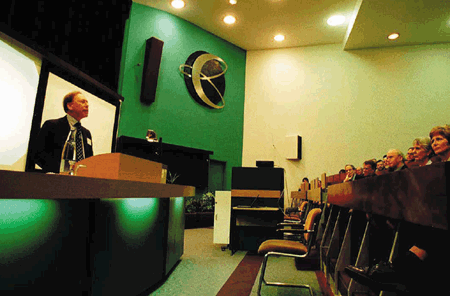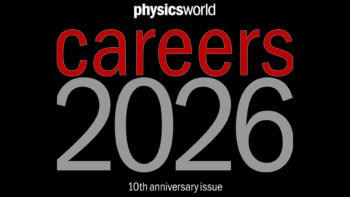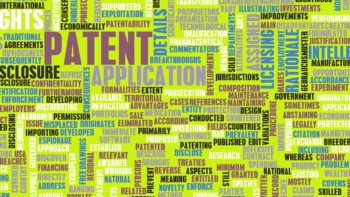What attributes and personal characteristics do you need to be a successful founding entrepreneur of a start-up firm? Valerie Jamieson talks to physicists who know what it takes.

Congratulations, you’ve developed a unique technology. You’ve done your homework and you’re convinced that there is a market for it. But before you throw away your lecture notes and hang up your safety goggles, it is worth asking yourself a few more questions. After all, physicists enter a different world when they launch a start-up. First they must switch to a new way of thinking and a radically different style of communication. Relocating to a new office off-campus, wearing sharp suits and giving PowerPoint presentations may be a step in the right direction. But are you really cut out for life in an entrepreneurial world?
Physicist Alex Glass is no stranger to entrepreneurs. Before moving to the US Air Force’s European research and development office in London earlier this year, he spent six years at the helm of an organization that helps emerging technology companies in the San Francisco Bay Area – the undisputed capital of start-ups. Glass believes that successful entrepreneurs are unique people. “They are strong-willed when everything looks as if it will fail, yet they are flexible enough to change strategy when the market changes,” he explains. “These two characteristics are so contradictory. But you need them both to be successful.”
To transform your start-up from an idea to reality – and to make it grow – you’ll also have to attract people with management, marketing and business expertise. You’ll also have to be prepared to divide the rewards with them. “I always tell scientists who complain that it’s better to own a 10% share in a large company than a 100% share in a small one,” says Glass.
Ups and downs of business
In many respects, physicists and entrepreneurs seem poles apart. In an ever-changing business environment there is often not enough time to assimilate all the data and analyse a problem scientifically. Glass recommends that physicists should ask themselves if they would feel comfortable making decisions without knowing all the information. “Physicists must be able to explain their goals to investors succinctly,” he adds. Scientific entrepreneurs tend to get carried away describing the wonders of their technology, rather than addressing the important issues of defining the market and competition, or how the product will be sold.
The same views are held by physicist David Potter, the founder and chairman of Psion, the mobile computer and communications company. “Most of the business plans I see are driven by what the engineers can do; not what the market wants or what the customer needs,” he adds. However, physicists do bring enormous benefits to business. “Physics teaches hard, abstract, logical thinking, which is exactly what one needs in industry,” says Potter. “I would encourage any physicist who is thinking of going into business to do so.”
Ilya Fishman, a founder of Optimight – an optical-networking company in San Jose, California – agrees: “Physicists can bring more to a company than engineers. They have an orthogonal way of thinking that can lead to new technological advances.”
That said, physicists who are tempted to start up their own companies must have the emotional stability to go through the ups and downs of business. “Are you prepared to put everything on the line for the company?” adds Glass. “Many successful entrepreneurs have come within days of becoming bankrupt. And so many marriages fail because of the stress involved. It affects the whole family.”
Another emotional challenge for scientific entrepreneurs is recognizing when it is time to let go of the technology. “Only 1 in 10 000 start-ups are successful enough to attract large-scale funding from venture capitalists,” explains Glass. “Unless your company is profitable from an early stage, the most likely outcome is that you’ll have to sell your technology to a ‘systems integrator’ – particularly if it is only a small part of a final product.” Are you prepared to relinquish control of “your baby” to someone else? Sharing a common vision of the company’s goals and objectives with your investors eases the pain.
Band of angels
Many technology entrepreneurs, particularly in the Bay Area, are not content to set up a single company. Often they invest their own money in companies starting up in the field in which they made their fortunes. In the US, these so-called business angels invest $15-30bn in some 30 000 businesses each year, spreading their investment over eight times as many companies as venture capitalists. But angels provide much more than just money. They bring knowledge of the market, experience and a wealth of contacts in both the industry and investment communities. They also act as mentors, advising companies in the early stages on how to start a business and how to present themselves to potential investors. “Having an angel gives a company credibility,” says Glass.
Far-reaching vision and business acumen are important characteristics of angels, but it is their personal qualities that are highly regarded. Des Smith, founder of Edinburgh Instruments, says that successful entrepreneurs are often good judges of people – a trait that is needed when it comes to putting together the management team. “Often you do not know if people will work well together until you try,” he explains.
Glass most admires Milton Chang who founded Newport Research, a US manufacturer of optical components, in the 1960s when lasers were first beginning to take shape. Chang recognized that they would have an enormous commercial impact and that soon everyone would clamour to buy laser components and equipment. “He has vision, stature and is an excellent mentor and counsellor,” explains Glass.
Meanwhile, Fishman recalls the support he received from venture capitalists John Walecka and Tony Sun, when he founded Optimight two years ago. “They were patient, friendly and understanding at a difficult time,” he adds. The old adage that investors invest in people, not products, has never been so true.”



